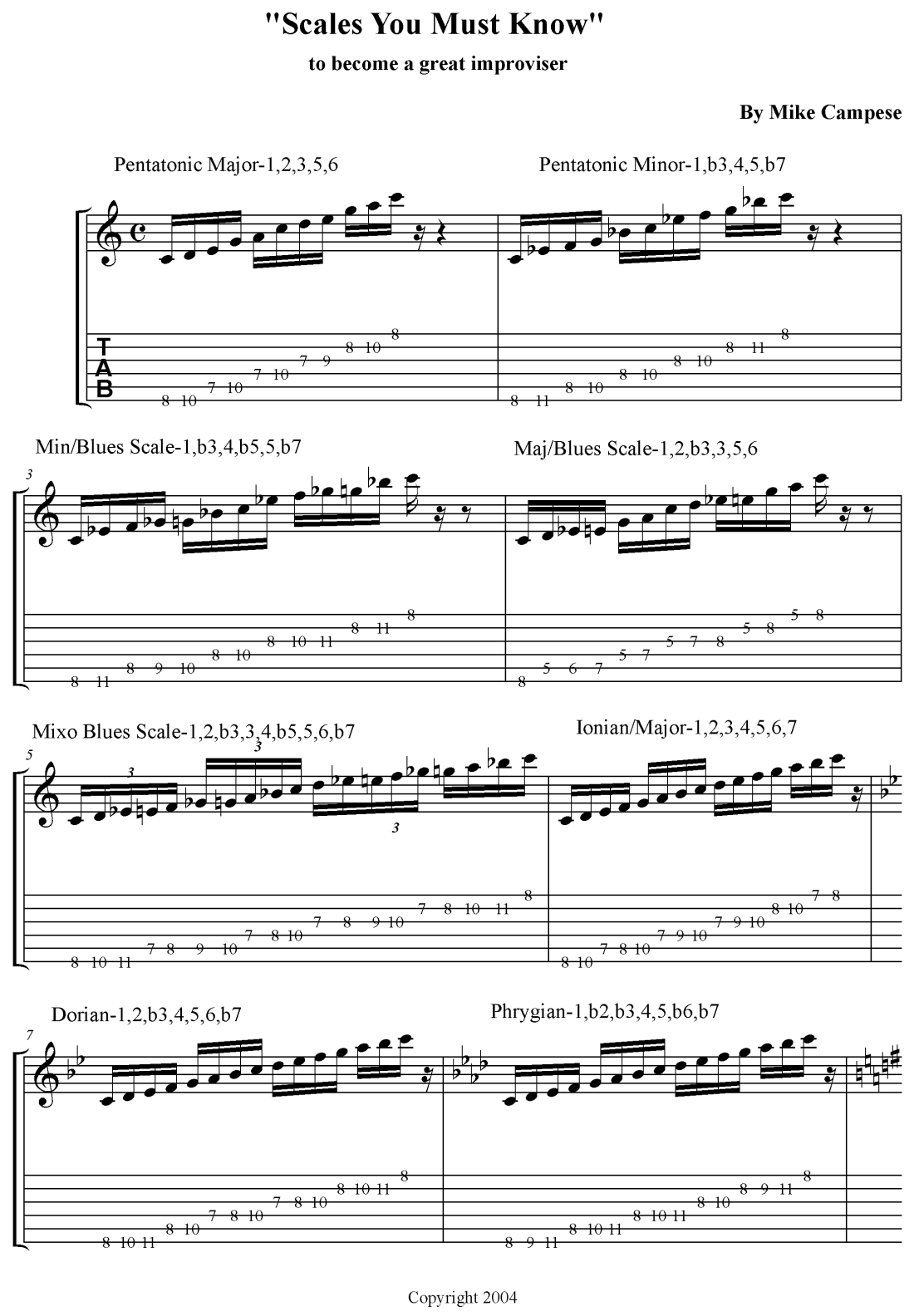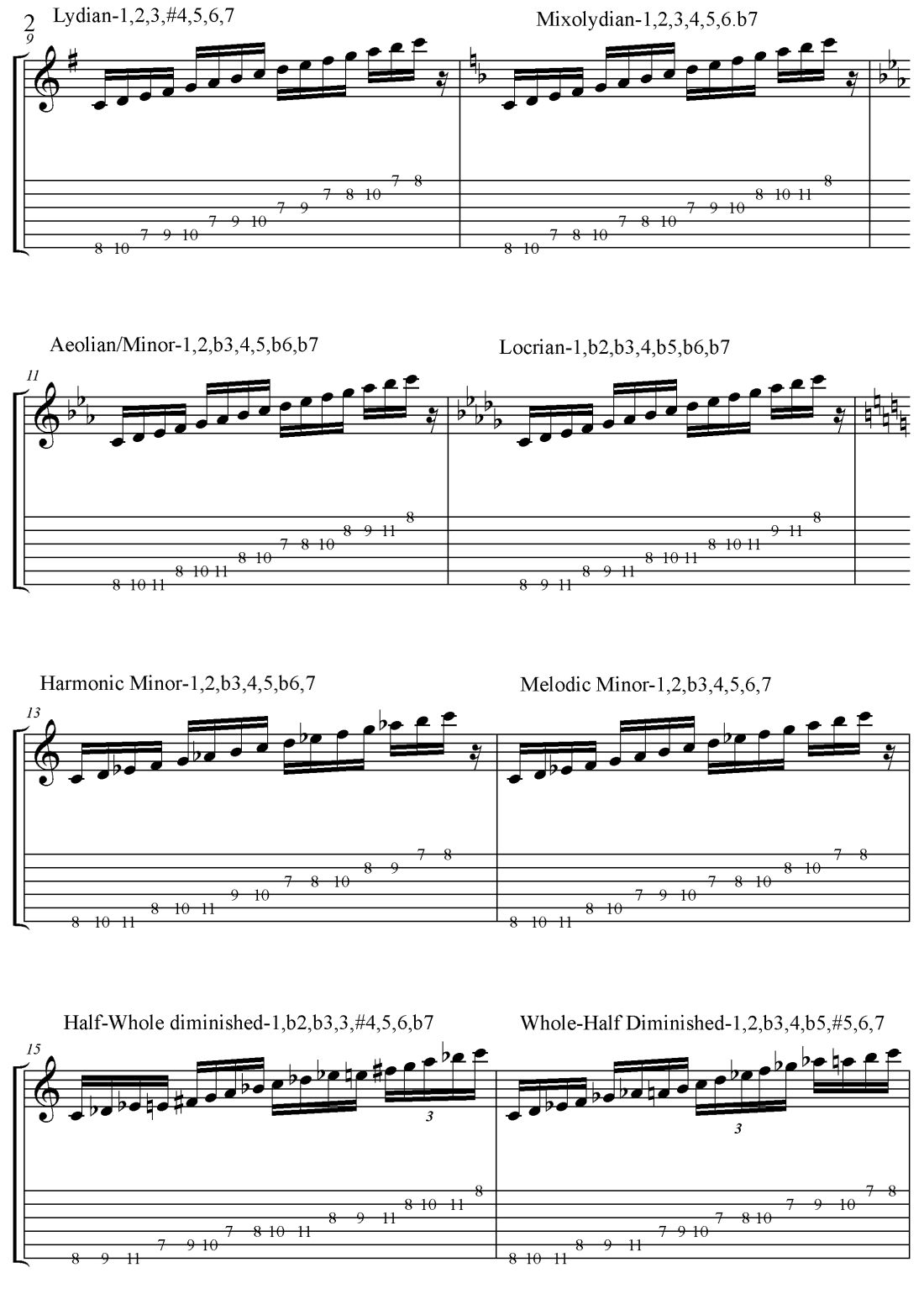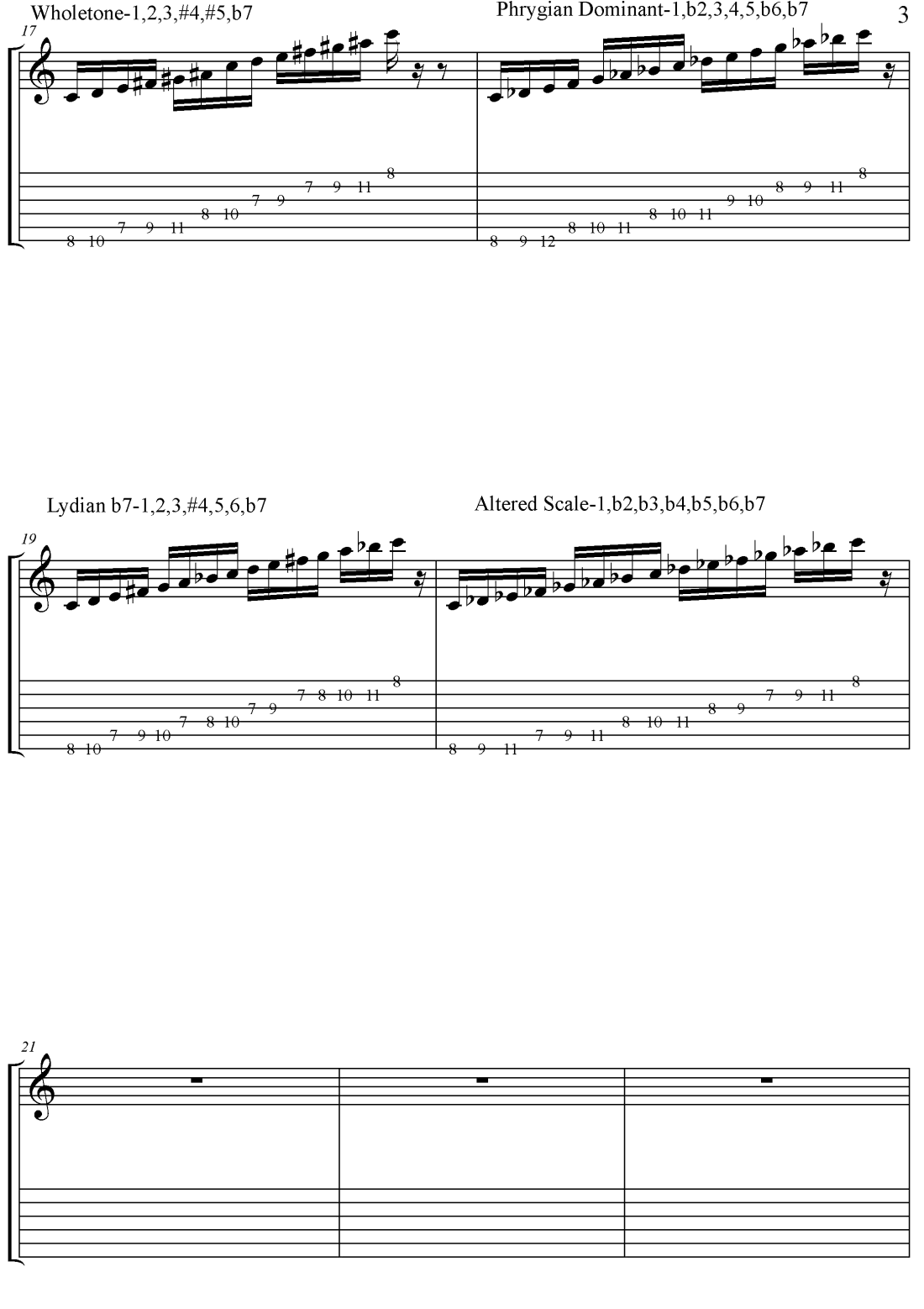Hello everyone! Welcome back! I hope you had a great summer. It's time to get back to work. This lesson i will be showing you all the really important scales you should know to become a great improviser in any style of music. I'll be giving you a brief description of each scale, how it is built, where you can use it, and more. I covered a lot of these scales in past lessons. This lesson should be used as a reference and I suggest you post it on your wall in your practice room. The goal is to memorize these scales by their formulas and the sound of each one, so you can incorporate them in your playing and writing.

The Pentatonic Major is a popular scale used in rock, blues and country, among others. This scale has a happy, upbeat sound. It is a 5 note scale built from the Major scale, with the formula 1, 2, 3, 5, 6. Use this scale over Major or Dominant progressions.
The Pentatonic Minor is one of the most used scales in rock and blues. It is a 5 note scale and it is built from the Minor Scale.The formula is 1, b3, 4, 5, b7. This scale can be used in many situations. It sounds best over any rock or blues progression.
Another very popular scale in rock and blues. Basically it is the same as the Pentatonic Minor but with an added b5th. The formula is 1, b3, 4, b5, 5, b7. Used by countless rock and blues players, this scale sounds best over blues and rock progressions.
The Major Blues scale is the relative major of the Minor Blues scale. It's just up 3 frets from the minor, for example Fm to Ab. The formula is 1, 2, b3, 3, 5, 6. This scale has a very upbeat sound used in country and bluegrass. It sounds great when you mix the Minor Blues and Major Blues scales together over a blues progression. Many well known blues players use that approach.
This is a very hip scale.This scale is built from the Maj/Blues and Min/Blues put together.The formula is 1, 2, b3, 3, 4. b5, 5, 6, b7.This is a more Jazzier approach.This scale also has a Mixolydian and a Dorian flavor to it,done in my own way.Use this scale to spice up your Pentatonic licks.
This is one of the most common scales in music, most everything is based off this scale. The formula is 1, 2, 3, 4, 5, 6, 7. It has a happy upbeat sound used in many styles of music.
This scale is the second mode of a Major scale. It is a minor scale; the formula is 1, 2, b3, 4, 5, 6, b7. It is like a pure minor scale with a raised 6th, which will give you a more jazzy flavor. This scale is very popular in rock and jazz.
The third mode of the Major scale, the Phrygian is minor scale with a b2. The formula is 1, b2, b3, 4, 5, b6, b7. This scale has a Spanish flavor and is used a lot in metal progressions.

The fourth mode of the Major scale. It has a Major sound, but with the raised 4th it produces a mysterious and somewhat jazzy flavor when used in rock and jazz. It is often used in movies.
This is the fifth mode of the Major scale. It is used over Major and Dominant chords. The formula is 1, 2, 3, 4, 5, 6, b7. This scale sounds great over blues progressions.
This is the sixth mode of the Major scale. A very popular scale, the formula is 1, 2, b3, 4, 5, b6, b7. A very sad sounding scale used in many styles of music.
The seventh mode of the Major scale, it is a very dark sounding scale. The formula is 1, b2, b3, 4, b5, b6, b7. This scale is heard in many metal progressions because it contains the b2 and the b5.
This scale is a Aeolian minor scale with a raised 7th. The formula is 1, 2, b3, 4, 5, b6, 7. The harmonic minor is a scale used in classical music and is also popular with many neo-classical rock shredders.
A Major scale with a lowered third. The formula is 1, 2, b3, 4, 5, 6, 7. A popular scale in jazz, the melodic minor is one of the three main minor scales. Try using this scale over minor progressions. Also, this scale sounds cool mixed with the Dorian mode.
This is a symmetrical scale, meaning it is built in half step and whole step intervals. The formula is 1, b2, b3, 3, #4, 5, 6, b7. Since it contains the #9, b9, 3 and b7, it is usually used over altered Dominant chords. For example C7(b9), or C7(#9). It also sounds great over minor 7th chords from the root. The cool thing about this scale is you can move a chord or pattern up minor thirds and it will be in the scale.
This scale is made up of whole steps and half steps. The formula is 1, 2, b3, 4, b5, #5, 6, 7. It is usually played over Diminished chords, because the Diminished 7th chord is built off the root. Try using this scale over minor chords for a different sound.

A scale constructed in whole steps. The formula is 1, 2, 3, #4, #5, b7. Works well over Dominant 7th(#5) chords and augmented chords. It has a very dreamy sound to it.
This is the fifth mode of the Harmonic minor scale. The formula is 1, b2, 3, 4, 5, b6, b7. This scale has a very Spanish flavor to it when played over major chords.
This is the fourth mode of the Melodic minor scale. The formula is 1, 2, 3, #4, 5, 6, b7. This scale is used a lot in jazz and fusion over Dominant 7th(#11) chords. Try using this scale over Dominant 7th chords to add color.
This is the seventh mode of the Melodic minor scale. The formula is 1, b2, b3, b4, b5, b6, b7. This scale is also known as the Super-Locrian scale. This scale is primarily used over altered dominant chords such as a Dominant 7th(b9), 7th(#9), and 7th(#5,b9). This scale contains the b9, #9, b5 and the #5, so it can be used over any of those chords.
OK, this wraps up our lesson! If you have any questions, feel free to e-mail me. Be sure to check out my CDs on this amazing site and check out my new CD release, "Vibe". Visit mikecampese.com for more information.
Mike Campese is an all-around music performer, session artist and teacher competent in many musical styles, electric and acoustic. He has studied at G.I.T. (Honors Graduate), and with Paul Gilbert, Norman Brown, Stanley Jordan, Scott Henderson and Keith Wyatt.